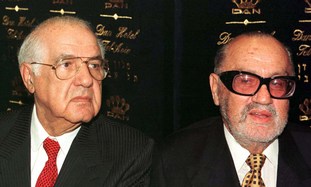The Israel lobby is like the Mafia. It’s commonly understood how it works, who its leaders are, how they wield their power through intimidation, and to what effect. But there’s a big difference between knowing the identity of a Mafia boss and being able to throw him in jail. Usually an informant needs to be wired so that incriminating words can get caught on tape.
The following story recounted by MJ Rosenberg, who was himself once an AIPAC official, goes beyond the broad brushstrokes that are usually employed to describe the impact of the lobby on American politics. It is more akin to evidence from a wire — evidence that those who get on the wrong side of the lobby risk having their lives destroyed.
This week, following that tumultuous reception for Prime Minister Netanyahu at the congressional joint meeting, I want to share a personal recollection of how the Middle East status quo is preserved on Capitol Hill.
It was in 1988 and I was a foreign policy aide to Sen. Carl Levin (D-MI). One February day, Levin called me into his office to say that he was disturbed at a quote he saw in that day’s New York Times. An article quoted Israeli Prime Minister Yitzhak Shamir saying that he rejected the idea of withdrawing from any of the land Israel captured in the 1967 war:
Mr. Shamir said in a radio interview, ”It is clear that this expression of territory for peace is not accepted by me.”
Levin instantly understood what Shamir was saying. He was repudiating U.N. Security Council Resolutions 242 and 338 (which Israel had helped draft) which provided for “withdrawal of Israeli armed forces from territories occupied in the recent [1967] conflict” in exchange for peace and security. Those resolutions represented official U.S. and international policy then, and they still do.
But, in 1988, Shamir tried to declare them null and void.
Levin asked me to draft a letter to Secretary of State George Shultz stating that it was the view of the Senate that the U.N. Resolutions remained the policy of the U.S. whether Shamir liked it or not. Of course, the letter wasn’t written in that kind of language. It was more than polite. Additionally, Levin wanted it addressed to Shultz, not to Shamir, to avoid ruffling too many feathers in Israel.
I wrote the draft. Levin edited and re-edited it. Then he called in the head of AIPAC, Thomas A. Dine, to run the language past him. Tom said it was “great.” Levin told Dine that he would not embarass him by revealing that he had approved the letter.
Levin then asked me to deliver it to the Secretary of State but said that first he would try to round up a few other senators to join him in signing it. In an hour he had 30. He probably could have gotten three times as many but it was Friday afternoon and most of the senators had decamped.
I delivered the letter. Because Levin wanted to avoid a brouhaha, the Levin office did no press about it. It was essentially a secret initiative.
But then one of the senators who had the letter gave it to the New York Times. And within minutes the phones started ringing off the hook. Reporters and AIPAC donors (who had no idea Dine had signed off on the letter) were going crazy. Levin was asked to appear on all three Sunday morning talk shows. He declined. In fact, he took off for Moscow, on a long-planned trip. [Continue reading…]

 The Ofer Brothers Group may be scurrying into damage control in Israel, Singapore, London and Washington, after the United States blacklisted it for trading with Iran, but Israel seems to be doing nothing to enforce international sanctions on Iran.
The Ofer Brothers Group may be scurrying into damage control in Israel, Singapore, London and Washington, after the United States blacklisted it for trading with Iran, but Israel seems to be doing nothing to enforce international sanctions on Iran. Reuters journalist Suleiman al-Khalidi, a Jordanian citizen, was arrested by Syrian security police when covering the uprising against Syrian President Bashar al-Assad. In the following story, he recounts his treatment at the hands of the Syrian intelligence services and the scenes of torture he witnessed around him during four days of confinement.
Reuters journalist Suleiman al-Khalidi, a Jordanian citizen, was arrested by Syrian security police when covering the uprising against Syrian President Bashar al-Assad. In the following story, he recounts his treatment at the hands of the Syrian intelligence services and the scenes of torture he witnessed around him during four days of confinement.